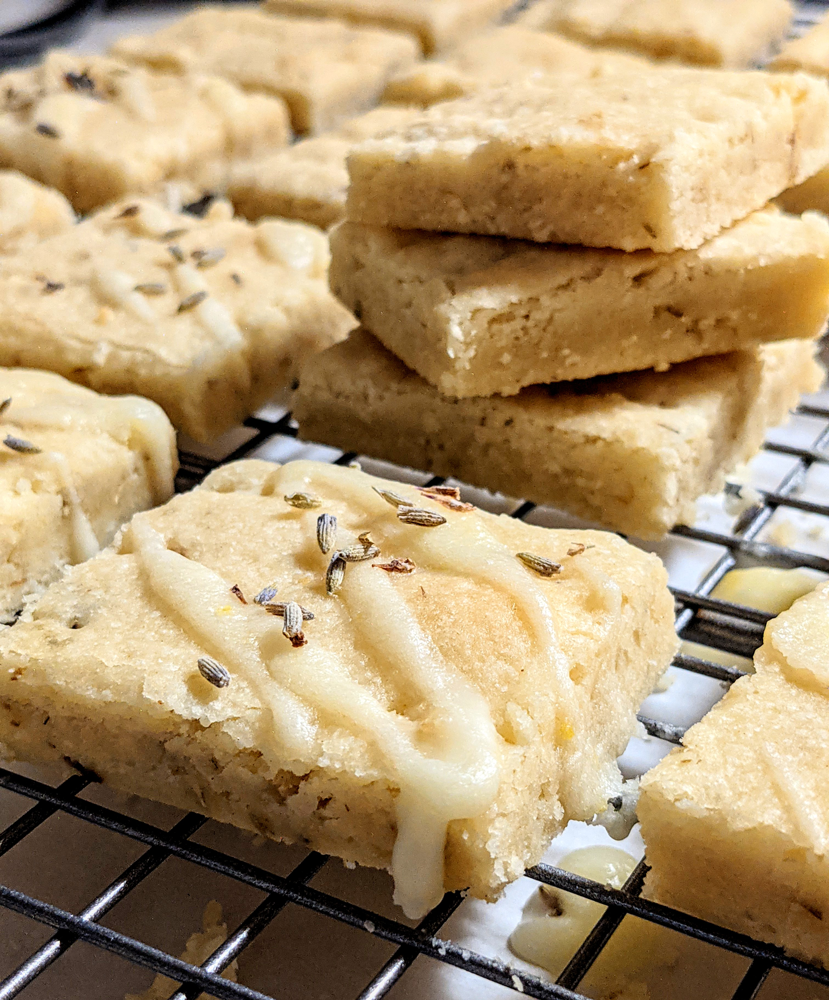Lemon lavender shortbread
Let’s jump right into it-
As someone who isn’t very good at math, I can confidently tell you that making shortbread is as easy as 1 2 3. No really, the most basic shortbread recipe you need to remember is 1 part sugar, 2 parts butter, and 3 parts flour.
The easiest way to do this is to think about your ingredients in ounces (oz). Grams work too, but I found measuring to be easier when I started with ounces, and then converted it to grams.
Say you start with 4 oz of sugar (113 grams). This is your 1 part sugar.
For how much butter you will need, take the ounces of sugar you have and multiply it by 2.
4x2=8. You will need 8 oz of butter (226 grams). This is your 2 parts butter.
For how much flour you will need, take the ounces of sugar and multiply it by 3. 4x3=12. You will need 12 oz of all- purpose flour (339 grams). This is your 3 parts flour.
Even converting into grams you’ll notice a similar pattern:
113 g (1 part sugar)
113 x 2 = 226 (2 parts butter)
113 x 3 = 339 (3 parts flour)
I’m still learning, and still tweaking my shortbread recipe, but if you’re interested in learning more, the flour handprint has a nice comprehensive guide on shortbread that is honestly a life saver!
Ingredients
4oz (113 grams / 1 cup + 2 Tbsp) of white granulated sugar
8oz. (226 grams/ 1cup) of unsalted butter, softened
12oz. (339 grams/ 2 ½ cups) of all-purpose flour
½ tsp kosher salt
1 Tbsp finely ground edible lavender buds
Zest of 2 medium lemons
Directions
Place the oven rack in the middle of the oven. Preheat to 350°F.
Prepare a 9 x13 in. sheet pan greased well with cooking spray. Cover with parchment paper. Set aside.
Add lemon zest and sugar to a medium bowl. Whisk together or massage lemon zest into sugar. (This infuses the lemon flavor into sugar, but totally optional).
Add softened butter to the bowl, and cream together until butter and sugar is fluffy.
Add in flour, salt, and grounded lavender. Mix with rubber spatula until just combined, and a dough forms.
Dump dough into the prepared baking sheet and press until even and smooth. You want the dough to cover the entire sheet, corner to corner. To help create an even spread, use a flat bottom (a drinking cup, measuring cup, etc.) to press.
Prick dough with a fork. This allows steam to be released as the dough cooks and prevents bubbles, and uneven puffs.
Bake in the oven for 20 minutes, turning half way through. Cookies are done when the top appears to be slightly golden brown.
Let rest for 10 minutes before cutting into squares.
Let cookies come to a complete cool before removing parchment paper and cookies from the sheet pan.
Store in an airtight container at room temperature for a week.

